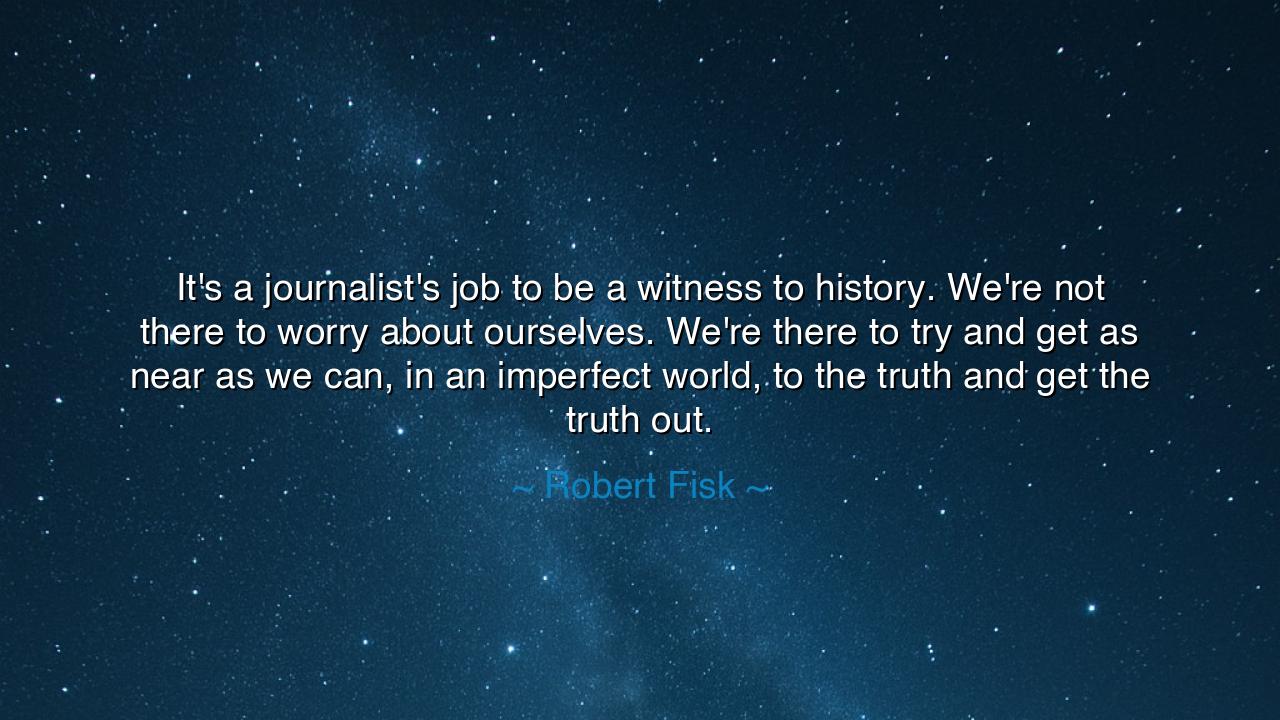
It's a journalist's job to be a witness to history. We're not
It's a journalist's job to be a witness to history. We're not there to worry about ourselves. We're there to try and get as near as we can, in an imperfect world, to the truth and get the truth out.






The war correspondent and truth-seeker Robert Fisk, a man who walked among the flames of the world’s greatest conflicts, once said: “It’s a journalist’s job to be a witness to history. We’re not there to worry about ourselves. We’re there to try and get as near as we can, in an imperfect world, to the truth and get the truth out.” In these words, Fisk captured the sacred burden of journalism — the calling not of comfort or fame, but of witnessing, of standing at the edge of chaos with pen in hand, seeking not safety, but truth. His declaration is both a creed and a warning, a reminder that in every age, the truth must be bought at the price of courage.
The origin of this quote lies in Fisk’s long and perilous career. For more than forty years, he reported from the frontlines of the Middle East — from Lebanon, Iraq, Afghanistan, and beyond. He saw with his own eyes the suffering of innocents, the lies of power, and the ruin that war brings upon the world. He was not a distant observer but a witness to history, walking through shattered cities, speaking to victims, confronting soldiers, and challenging those who justified violence. For him, journalism was not merely a profession; it was a moral duty — the act of holding a mirror to humanity so that even in the darkest hour, the world might see itself and reckon with the truth.
When Fisk says it is the journalist’s duty “to be a witness to history,” he evokes an ancient role, one older than modern media itself. In the days of old, there were scribes who recorded the deeds of kings, poets who sang of battles and betrayals, prophets who cried out against injustice. Their duty, like that of the journalist, was to preserve truth against the erosion of time and deceit. For history, if left to the victors, becomes myth — but the witness ensures that the cry of the powerless is not lost. The journalist stands, therefore, as both chronicler and conscience, reminding the world that truth is not owned by rulers, but revealed through honesty and courage.
Fisk’s conviction that one must “get as near as we can… to the truth” acknowledges that truth itself is not always pure or simple. It lives amid the dust and confusion of war, hidden behind propaganda, fear, and human frailty. No reporter, no matter how devoted, can capture the whole of it — yet the duty remains to seek it tirelessly, even in imperfection. In this, Fisk’s words echo the wisdom of the ancients: that truth is not a possession, but a pursuit. Like Diogenes walking through Athens with a lantern, the journalist wanders through the smoke of battlefields and the halls of power, searching for a light that flickers but never dies.
Consider Fisk’s own life as an example of this sacred struggle. During the Lebanese Civil War, he reported from the ruins of Beirut, where bombs fell like rain and the line between good and evil blurred. He saw civilians massacred, cities reduced to ash, and nations torn apart by lies. Yet he stayed — not as a spectator, but as a witness, writing with the fury and compassion of one who understood that silence is complicity. His reporting from the Sabra and Shatila massacre in 1982 revealed horrors the world might have preferred to ignore. In those moments, he embodied the very essence of his quote: to stand in danger, unmoved by fear, and tell the truth because it must be told.
Through his words, Fisk also challenges the weakness of modern comfort — the tendency of people to avert their eyes, to drown truth in distraction. When he says, “We’re not there to worry about ourselves,” he speaks not only to journalists, but to all who would serve justice. He reminds us that truth demands sacrifice. It requires the courage to stand in the open when lies offer shelter, to risk hatred and misunderstanding for the sake of clarity. A world that ceases to produce such witnesses becomes blind, for history without truth is no longer history — it is merely propaganda written in the language of power.
Therefore, let this be the lesson drawn from Robert Fisk’s words: that every one of us, in our own measure, must be a witness to truth. You need not hold a pen in a war zone to live by this creed. Speak honestly when falsehood tempts you. Stand for what is right even when it costs you comfort. Seek understanding rather than convenience, and look upon suffering not as spectacle, but as a call to conscience. For history is written not only by those who rule, but by those who dare to tell what they have seen.
And so, my children of this fleeting world, remember this: to witness is to preserve humanity. The truth may wound, but falsehood destroys. The witness walks a lonely path, yet their footprints mark the way for generations to come. Be that witness — in your words, in your deeds, in your courage to see clearly and speak freely. For though the world is imperfect, as Fisk said, it is through the relentless seeking of truth that it may one day be redeemed.






AAdministratorAdministrator
Welcome, honored guests. Please leave a comment, we will respond soon